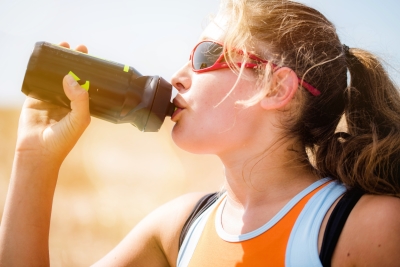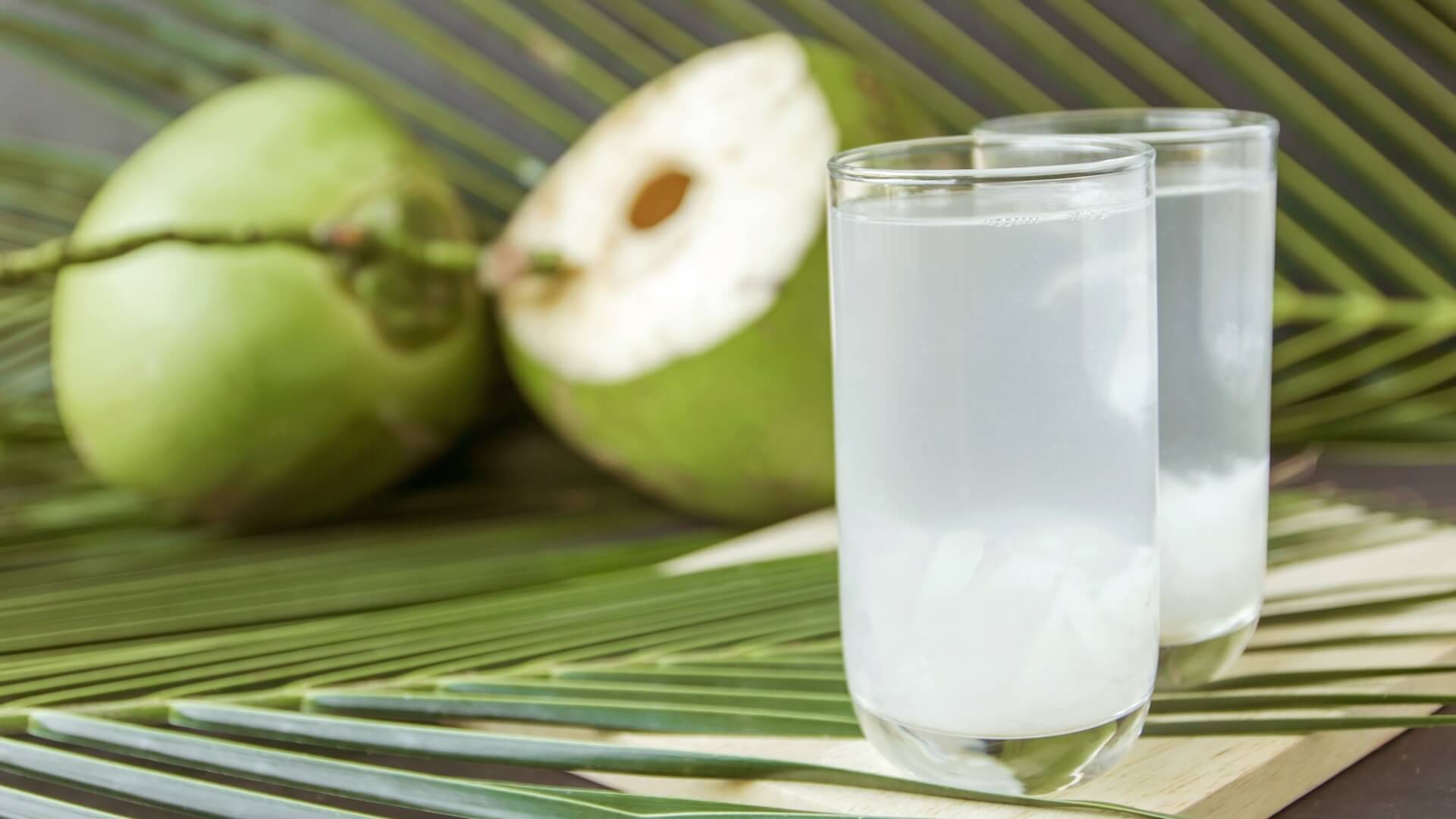Coconut water has gained immense popularity in sports and fitness over the past few years. It is viewed as a ‘natural’ low-calorie drink, and athletes have been using it as a replacement for typical sports drinks due to its high electrolyte content.
However, athletes do not realise that these electrolytes are not the ones they are losing in their sweat. Our sweat consists mainly of water and sodium. Other electrolytes such as potassium, calcium and magnesium are much lower in comparison.
Coconut water contains a high amount of electrolytes, but mainly potassium, which is not widely appreciated by athletes (3,4). Because it is also quite low in sodium, it is generally not fit to replace sodium losses during exercise (3,4). During prolonged exercise, especially in the heat, replacing sodium losses with fluids is paramount to maintaining an adequate fluid and electrolyte balance (1,2). If sodium is not replaced when there is fluid intake to match sweat losses, an athlete puts themselves at great risk of hyponatraemia (low sodium levels) (1,2). For this reason, the main component of commercial sports drinks is sodium.
Coconut water research in sport and exercise science
Coconut water has not yet been extensively researched in sport and exercise nutrition science. However, one study by Kalman et al compared coconut water and a carbohydrate-electrolyte sports drink on hydration and performance measures in trained men (5). On four separate occasions, in a randomised cross-over manner, 12 men received either water, pure coconut water, or a concentrate or a carbohydrate-electrolyte sports drink after a 60-minute treadmill exercise. The amount of fluid given was based on their body weight loss during exercise, and participants were allowed 60 minutes to consume the entire volume of fluid.
The researchers found no differences between the four drinks regarding hydration or performance measures. The likely explanation is the relatively short duration of the exercise protocol – athletes do not generally lose significant amounts of fluid and electrolytes in a limited time period. Perhaps a more vigorous and prolonged exercise protocol would have produced different results. Some participants also reported gastrointestinal distress symptoms with the two forms of coconut water. This was likely due to the high volume of fluid they were required to drink during the 60-minute time frame after exercise.
In another study, on two separate occasions in a randomised, crossover manner, researchers gave cyclists 250ml of water or coconut water during a 60-minute submaximal cycling trial, followed by a 10-km time trail (6). They also found no significant differences in hydration or performance measures between the two beverages.
What about heat and coconut water consumption?

On the contrary, one study showed improved exercise capacity in the heat following coconut water consumption (7). Eight active men were recruited to perform a time-to-exhaustion test at 34ºC on three separate occasions. They were randomly assigned to consume either plain water, a flavoured drink, or coconut water 20 minutes before each trial. The participants were able to exercise, on average, almost three minutes longer (~23 minutes) in the coconut water trial compared to the plain water (~18.5 minutes) and flavoured drink (~19 minutes) trials. This difference is likely due to coconut water’s carbohydrate content, which was 11g per 200ml, while the flavoured drink was only 0.7g per 200ml. The researchers also observed a higher heart rate during the longer time-to-exhaustion coconut water trial, which may be explained by greater fluid retention. Indeed, they also observed a smaller urine output, suggesting a greater hydration capacity.
All other studies are pretty consistent. With regard to hydration and performance, coconut water seems to be as effective as water and sports drinks when consumed during and after exercise. It might even be a better option before exercising in the heat. However, that might differ in the context of long-duration and exhaustive exercise where sodium losses are crucial. Even if it is a ‘natural’ drink, the lack of sodium means it is not an ideal sports drink when you are sweating a lot.
Another potential problem with drinking coconut water is if it is consumed in excessive amounts. A case study of a 42-year-old male tennis player reported that he was hospitalised with hyperkalaemia (high potassium levels) due to drinking an excessive amount (~2.5 litres) during a match (8). He lost consciousness, and if left untreated, he could have died.
Conclusion
So, does this mean we should not consider coconut water as a sports drink? I suggest making it a safer and more effective option by adding a pinch of sea or rock salt. You could also add a bit of raw honey to increase the carbohydrate content to obtain a 6-8 per cent solution, the typical concentration of a sports drink. Even so, do not over-drink it due to its high potassium content. If your exercise session is less than an hour, you can rely on coconut water, but just drink it to thirst – it won’t kill you.
If you’re exercising for longer periods when sweat losses are greater, consider other sports drinks and electrolyte replacement alternatives, or if you like coconut water, consider alternating with water plus electrolytes and/or another DIY sports drink. And, of course, always look at the list of ingredients. Many commercial waters are made from concentrates and have added sugars or additives.
- Anatasiou C et al (2009). Sodium replacement and plasma sodium drop during exercise in the heat when fluid intake matches fluid losses. J Athl Train. 44(2):117-123.
- Lewis D et al (2018). Considering exercise-asscoiated hyponatraemia as a continuum. BMJ Case Reports.
- Kuberski T et al (1979). Coconut water as a rehydration fluid. N Z Med J. 90(641):98-100.
- Farapati et al (2016). Understanding sodium and potassium content of coconut water and the role as healthy food. Presented at: The 2nd International Conference on Food Agriculture and Natural Resources. Universitas Brawijava, Malang – East Java, Indonesia.
- Kalman DS et al (2012). Comparison of coconut water and a carbohydrate-electrolyte drink on measures of hydration and physical performance in exercise-trained men. J Int Soc Sports Nutr. 9:1
- Peart D et al(2017). Coconut water does not improve markers of hydration during sub-maximal exercise and performance in a subsequent time trial compared to water alone. Int J Sport Nutri Exerc Metab. 27(3):179-184.
- Laitano O et al (2014). Improved exercise capacity in the heat followed by coconut water consumption. Motriz: Rev. Educ. Fis. 20(1):107-111.
- Hakimian J et al (2014). Death by Coconut. Circulation: Arrythmia and Electrophysiology. 7(1):180-181.
Simone do Carmo MSci SENr CISNCert is a sports nutritionist, exercise physiologist and personal trainer. Within the Centre for Integrative Sports Nutrition, she is the joint course coordinator and student facilitator. Simone is a practitioner registrant on the UK Sport and Exercise Nutrition Register and owns Personal Best Fitness & Nutrition.
Twitter/X: @Sport_Bokkie
LinkedIn


